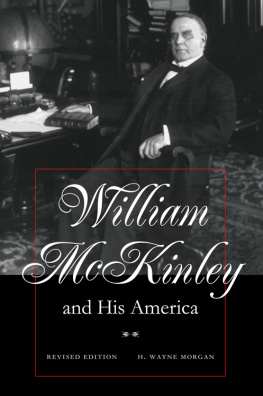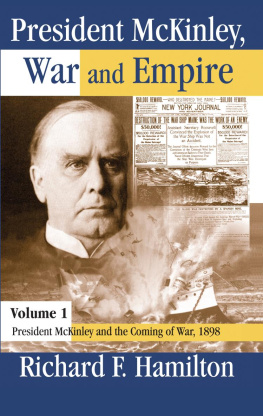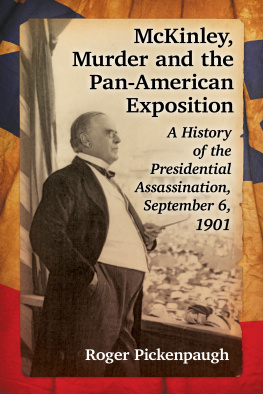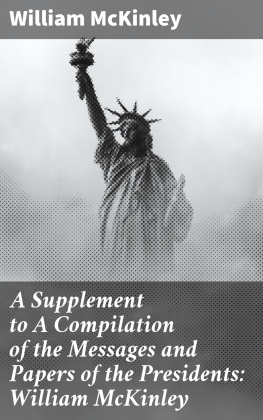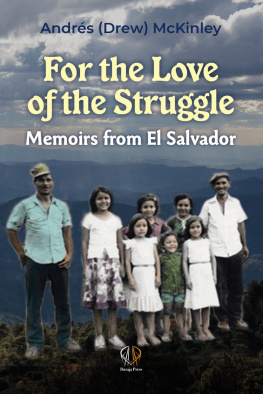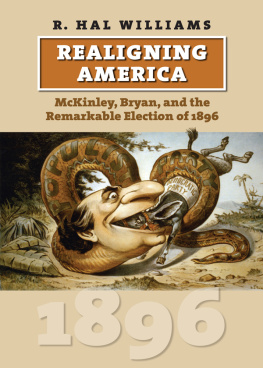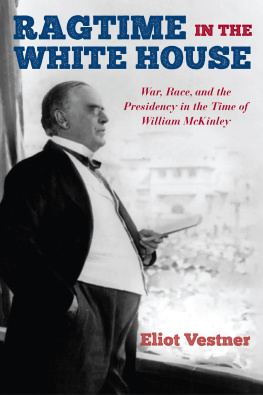William McKinley and His America
William McKinley
and His America
REVISED EDITION
H. Wayne Morgan
The Kent State University Press
KENT & LONDON
To George E. Mowry (19091984)
To Brainerd Dyer (19011980)
2003 by The Kent State University Press, Kent, Ohio 44242
All rights reserved
Library of Congress Catalog Card Number 2002011850
ISBN 0-87338-765-1
Manufactured in the United States of America
Library of Congress Cataloging-in-Publication Data
Morgan, H. Wayne (Howard Wayne)
William McKinley and his America / by H. Wayne Morgan.Rev. ed.
p. cm.
Inlcudes bibliographical references and index.
ISBN 0-87338-765-1 (alk. paper)
1. McKinley, William, 18431901.
2. PresidentsUnited StatesBiography.
I. Title.
E 711.6. M 7 2003
973.88092dc21
2002011850
British Library Cataloging-in-Publication data are available.
12 5 4 3
CONTENTS
B ooks are much like children. In both cases the authors imagine that they control the progress and development of their creations. In due course they realize that each has a life of its own, with changing meanings and perspectives. So it has been with the first edition of this book, published in 1963. I have been gratified to see its contribution to historical studies of the period involved but have become increasingly sure that it needed updating. Hence this revised and expanded edition.
A good deal of important secondary literature dealing with William McKinley and his times has appeared since 1963. I have reviewed it for this second edition and have added sources in the footnotes where I thought interested readers might like to pursue a subject. I have also included a bibliographical essay, which the first edition lacked, in which I discuss some of the most important works published since 1963 that treat both the man and his times. I have not changed many of my views but have enlarged some analyses and interpretations. I have also improved the style and have corrected some errors.
This revision reinforces my view that William McKinley merits enhanced recognition. His personal life is interesting in itself. He is interesting and important as a type of politician who was effective in harmonizing differences and achieving results in a tumultuous generation. As president he dealt with some of the most significant problems in the countrys history. His views of them and decisions about them take on added significance because of their impact on subsequent events and policies. He is clearly one of our most important presidents and deserves attention both as a personality and as a leader. I should emphasize that this is a biography not a history of the period. I focus on the man and his actions while trying to set both against suitable background. This is not, for instance, a history of the war of 1898 but of McKinleys role in it. I have also tried to make him seem personal and to capture some sense of the times. The reader will judge my success.
The Preface to the First Edition reveals my original obligations and thanks to many individuals and institutions. My gratitude for their assistance is as great now as it was then. For the revised edition I wish to thank the staff of the Manuscripts Division, Library of Congress, for assistance during several visits. I am grateful to Catherine Johnson for furnishing material from the Charles Warren Fairbanks Papers and to Saundra Taylor, curator of manuscripts, who gave permission to quote from this material, which is used courtesy of the Lilly Library, Indiana University, Bloomington. Sincere thanks go to Michele Moore, my manuscript preparer and editor. She caught errors and inconsistencies and properly demanded more explanation and clarification of many points. Her patience and exactitude made this a better book. I am grateful to John Hub-bell, director emeritus of The Kent State University Press, for the opportunity to produce this new edition. The current director, Will Underwood, and his talented staff have been most helpful. My last, but certainly not least, thanks go to my wife, Anne. She was not around for the first edition but has gone through this one with patience, good humor, and constant support.
T he Ohio River crosses the land in a great fertile valley, giving wealth and beauty to six states. Throughout much of the nations history it was a cultural as well as geographic boundary. To its south gentle hills and valleys fell away to a land that slavery marked and to an old agricultural way of life. To its north lay a land rich in earth, mineral wealth, and with a heterogeneous population. In the autumn and summer the Ohios waters move easily past the beauty on its banks. In spring and winter its languor becomes power, and ice and mud often swirl upon mans works as though the river still prized its independence. The beautiful Ohio is still a boundary between old and new, North and South, though in its waters and along its banks all of these meet and mingle.
The great river carries water to the Mississippi. In the eighteenth and early nineteenth centuries it also carried people from East to West. Of those who came to its valley in the eighteenth century none were more diverse, numerous, or influential than the Scotch-Irish. Their first homes were in Virginia, Pennsylvania, and the entrepts of the East Coast. From there they moved to Kentucky, West Virginia, Ohio, all the western frontier.
Few national groups have given more to the American heritage than the Scotch-Irish. They turned much of their strength to the basic crafts that sustain life. Their physical stamina carried with it a fierce independence, coupled with respect for the law and individual rights, that placed them on the side of the Revolution in America. Not averse to good living and high spirits, they combined sport with work. Most important, they brought with them to a new land the customs of an old civilization, and respect and demand for education and learning that made them carriers of culture on the frontier.
William McKinleys ancestors came from the Scottish highlands, where they were famous for their independence.their fight. Legend records that in the Battle of Pinkie in 1547 a stalwart highlander named Findla Morh, or the Great Findla, was killed. In Gaelic his name read Fionn-Laidh, and was pronounced I-on-lay. His four sons took the name MacIanla, meaning sons of I-on-lay. Their descendants shortened and simplified the name to MacKinlay.
The MacKinlays, restless as well as hardy, eventually settled near Calender, in Perthshire. In 1690, James MacKinlay, James the Trooper, joined the army of William III, en route to Ireland, as a guide, and stayed after the Battle of the Boyne, July 1, 1690, to found the Irish branch of the family tree.
The story of their ultimate migration to the New World is clouded in history. Why they came, who was involved, where they first settled, and the path of their westward movement is all uncertain. That they came to better themselves was undoubtedly true. They may also have come, like the ancestors of William McKinleys mother, for religious freedom. The earliest MacKinlay immigrant to the New World was David McKinley, who at the age of twelve settled in York County, Pennsylvania, early in the eighteenth century. David the Weaver, as he was called, adopted the McKinley spelling.

